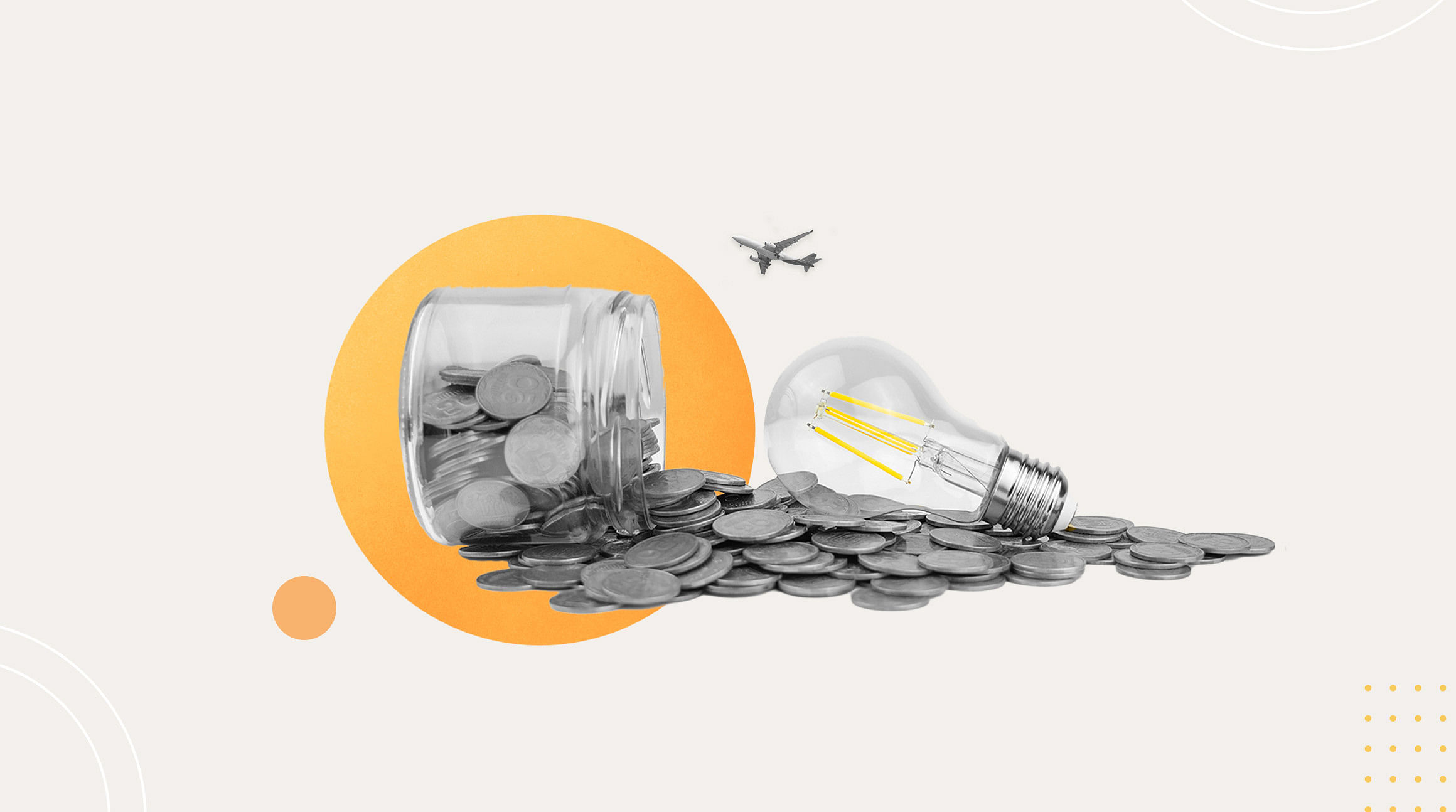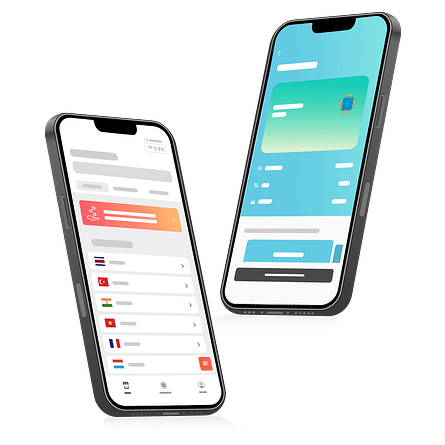
Nothing bursts that post-vacation bubble faster than checking your credit card statement and realizing that yes, spending money abroad does in fact count. As you land back in reality, the financial hangover and guilt start to creep in, making you question the worthiness of your trip. Here's the thing — your buyer's remorse is valid, but it shouldn't cast doubt on the value of your travels. Even when plans go awry, exploring the world is always worthwhile. The key is maintaining your financial peace of mind with a comprehensive travel budget.
Not sure where to start? Well, you're in the right place. We're sharing everything you need to know about budgeting for your next trip to help you avoid that dreaded post-vacation financial hangover.
In this article:
- Why do you need a travel budget?
- Everything you should include in your travel budget
- 5 steps to help plan your travel budget
- Practical tips to help you save money while traveling
- Travel budget FAQs
Why Do You Need a Travel Budget?
Let's be honest, budgeting is kind of a buzz kill, especially when it comes to planning out an eagerly anticipated international trip. That's because when you think of budgets in terms of dollars and cents (and euros and pounds), they feel a bit restrictive. But your travel budget is more than just a financial threshold: It's a roadmap that helps you maximize your travel experience while staying within your means.
Is it a bit tedious to map out your expenses? Sure. But ensuring you can cover travel essentials like flights and accommodation allows you to enjoy those unforgettable travel experiences without the guilt. The best part? There are no rules dictating how much you need to spend where, so you have the freedom to allocate your money based on what matters most to you. That means if you'd rather survive on nothing but baguettes and cheese to afford tickets to see your favorite artist perform live in Paris, you can — which actually sounds pretty empowering.
 Freepik
Freepik
Everything You Should Include in Your Travel Budget
Before you whip out your calculator, it's important to know exactly what you need to include in your travel budget. Although your specific budget will be heavily influenced by your itinerary, be sure to include these common travel expenses.
Passport and Visas
As exciting as it is to start searching for flights and accommodation, take a peek at your passport's expiration date first. To enter many countries (like China, Egypt, India, and Thailand), your passport needs to be valid for six months post-arrival. If your expiration date doesn't make the cut, you'll need to renew it before your trip. While renewal fees vary by country, in the U.S., passport renewals start at US$130, with additional fees for expedited timelines.
Depending on your nationality and destination, your passport might be all you need for your trip. However, many countries now require advance visas with associated entry fees. These fees start at around US$30 and go up from there. If your journey involves multiple stops or a more expensive entry fee, these visa costs can quickly add up. So keep these paperwork expenses in mind while planning out your travel budget.
Travel Insurance
Although some travelers are willing to roll the dice when it comes to travel insurance, it's arguably the most important aspect of your travel budget. Why? Well, if you get sick or into an accident while abroad without travel insurance, all that time you spent meticulously budgeting goes right out the window. Especially if you need to be urgently flown home for medical treatment. Is there a chance you'll pay for insurance and never use it? Of course. But it's better to be safe than sorry. Fortunately, many credit cards offer free travel insurance (or affordable add-ons), so make sure you give them a call before purchasing through a travel company.
Vaccinations
While COVID-19 vaccinations only recently became a travel requirement, other routine and travel-related vaccinations don't get quite as much attention. But that doesn't mean they're needed any less. To stay safe while abroad, consult your doctor before you travel, and remember to include the additional vaccination costs in your travel budget.
Clothes, Gear, and Toiletries
Whether your pre-trip shopping list includes swimsuits, safari gear, or medical supplies, these are all trip-related expenses that should be included in your budget — and yes, even if you buy them months in advance, it still counts as a travel expense.
Transportation
Your flight will undoubtedly eat up a large chunk of your transportation budget, but your transportation needs don't begin and end at the airport. Although the costs of car rentals, taxi services, and public transportation may be minuscule in comparison, over the course of your trip, they'll add up. And while you may be able to snag a cheaper flight by being flexible with your travel dates, there aren't quite as many deals to be had when it comes to local transport. So, do some research on average rates, and plan accordingly!
Accommodations
Accommodation is another big-ticket item that will likely take up a large portion of your travel budget. Understandably, these costs vary considerably depending on where your travel takes you, but it's important to pre-emptively budget for them nonetheless. Whether you prefer five-star hotels or budget-friendly hostels, proactively factoring in these costs will ensure you're comfortable while establishing a realistic financial plan for your trip.
Attractions and Activities
Once you've earmarked a healthy portion of your budget for your must-have expenses, it's time to make room for the fun stuff. This category encompasses activities such as tours and excursions, the extent of which will largely depend on your priorities. For example, if you're heading to the Bahamas primarily for a two-day snorkeling excursion, you may choose to spend less on food or accommodation.
Shopping and Souvenirs
Again, depending on your preferences, you may want to allocate more of your budget to shopping and souvenirs than attractions. This part of your budget can include things like clothing, souvenirs, local specialties (like wine, cheese, or sorrel), and gifts for your loved ones who weren't able to make the trip. Just remember to keep your purchases small to avoid paying extra baggage fees on your return flight!
Food and Dining
Whether you're planning on eating simply at local grocers or indulging at high-end restaurants, you'll probably end up spending more than you think. This is particularly true if you're staying in tourist hotspots. To help your money go further (and enjoy authentic local cuisine), find out where the locals eat. You'd be surprised at how much more affordable (and delicious) dining out can be when you're not unknowingly paying that premium tourist tax.
Communication
It's also important to pre-plan and budget for communication while you're away. You just never know when you'll need your phone. And while your local carrier likely has an international roaming package, these are often expensive and come with restrictions. With an eSIM from Airalo, you can stay connected, eliminate unexpected roaming fees, and keep your communication budget on track.
Emergencies
It's a fact of life that travel rarely goes to plan. Setting aside an emergency fund for unexpected expenses (like rebooking a flight) or medical emergencies will help safeguard your travel budget against the unknown. Best case scenario? It's left over at the end of your trip and you can splurge on something you wouldn’t otherwise have the budget for, or save it for your next adventure.
 Unsplash
Unsplash
5 Steps To Help Plan Your Travel Budget
Overwhelmed by the sheer amount of costs you need to consider? Keep reading. These five steps will help you identify, estimate, and prioritize your expenses, so you can enjoy your trip without any financial stress.
Identify and Estimate Your Big Ticket Items
It's always best to start with the big-ticket items like flights, accommodations, and any major activities you plan on doing while abroad. Do your research and use travel websites to compare prices before booking. By simply changing your travel dates to mid-week rather than over the weekend, you can save hundreds of dollars on your flight. Use these estimates as the foundation of your budget to ensure you have enough money to enjoy your trip once you get there.
Estimate How Much You'll Be Spending on the Main Travel Categories
Once you've estimated your big-ticket items, spend some time estimating main travel categories like food and transportation, as this will take up the second largest chunk of your budget. Start by doing a little research to determine local costs of transportation and food. From there, you can prioritize where you'd like to spend your money.
Ensure You Include Estimates for All Items
While it can be difficult to accurately consider every single expense you'll encounter on your trip, visualizing it from start to finish can help. Create an expense list including everything from your morning cup of coffee at the airport to your taxi home, and everything in between. This will shine a light on how far your budget needs to stretch and make establishing your priorities much easier.
Establish Your Priorities
With your comprehensive checklist at the ready, you can identify and prioritize the travel experiences that mean the most to you. For instance, if your itinerary is so packed that you'll rarely be at your hotel, you can opt to stay in a more affordable hotel or hostel and spend your money on activities instead. Try to be as flexible as you can with non-essential items to leave room for what you really care about.
Start Saving
Once your travel budget is sorted, it's time to create a savings plan to help you get there. Set a realistic timeline, determine a monthly savings target, set up a dedicated savings account, and outline cost-saving steps you can take to achieve your goal. Although sacrificing your weekly takeout order may not be ideal, travel memories last much longer than a meal, so do your best to stick with it!
 Freepik
Freepik
Practical Tips To Help You Save Money While Traveling
After trimming down non-essential expenses to save for your travels, it can be tempting to treat yourself more than you typically would during your trip. But that defeats the purpose of budgeting in the first place, so lean on these money-saving tips to stay on track during your journey.
Do Your Research
There's nothing worse than falling for a tourist trap or realizing you spent twice as much on your taxi from the airport than you had to. Knowledge is power here. Before you travel, research local rates for things like taxis, meals, and even coffee. That way, if someone tries to charge you extra, you can politely decline from the start.
Book in Advance
Whenever possible, it's always more cost-effective to plan ahead. And that applies to more than your flight and accommodation. By pre-planning and booking activities, you'll get better deals and discounts, and avoid the decision fatigue that often comes with long-term travel.
Live Like a Local
Between frequent taxis and eating out for most meals, being a tourist comes at a cost. To make the most of your budget, do like the locals do. That includes using public transportation, walking, exploring local markets, and venturing off the beaten path to eat where the locals do. Not only will you save money, but you'll also immerse yourself in a more authentic experience, creating lasting and shareable travel memories.
Stay in Budget Accommodations
Let's be honest, you're probably not going to spend much time in your hotel room. That's kind of the point of traveling, right? You want to get out there and see as much as possible. So, why spend a huge portion of your budget on accommodation? With options like Airbnb, hostels, and guesthouses, you can spend less on accommodation and have a more authentic local experience.
Use an eSIM
While your first instinct may be to purchase a daily international roaming package from your mobile carrier, spending an extra $12 to $15 a day to use your phone with restrictions is pretty pricey. Plus, there's always the risk of going beyond the limits of your plan. The more budget-savvy option? An eSIM from Airalo. With reliable, cost-effective data plans for international travel, an eSIM from Airalo keeps you connected without the risk of racking up roaming fees — so you can spend your money on experiences you'll remember, rather than the mobile services that helped you get there.
Never worry about roaming fees derailing your travel budget again with an eSIM from Airalo.
 Freepik
Freepik
Travel Budget FAQs
How Much Money Do You Need for a Travel Budget?
The short answer? It depends. Even two travelers with the same destination and timeline could have wildly different budgets based on their travel preferences (like accommodations, food, and activities), and priorities for their trip. To determine how much money you need for your travel budget, research local costs and create an expense checklist to help you manage your budget effectively.
How Can You Plan for Unexpected Expenses When You're Traveling?
When it comes to planning for unexpected expenses while traveling, a good defense is the best offense. Even if your trip is relatively short, you should always invest in comprehensive traveler's insurance and allocate a portion of your travel budget as an emergency fund. It's also a good idea to have a reliable way to seek help should an emergency occur.
Is There a Formula for Establishing a Base Travel Budget?
To establish a base travel budget, begin by assessing the amount you've saved or plan to save for the trip, along with your monthly expenses (like rent, car payments, and insurance). Deduct your monthly expenses from the overall budget to determine how much is available for the trip while still covering essential costs. To get more specific, you can divide this number by the number of days you plan on being there for a rough idea of your daily budget. This will help you identify whether your budget will cover the travel experiences you want or if you need to save for a little bit longer.



